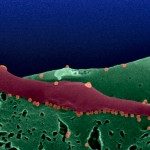Lien vers Pubmed [PMID] – 25855750
J. Virol. 2015 Jun;89(12):6418-26
UNLABELLED: Coronaviruses (CoVs) are unique in encoding a 3’→5′ exoribonuclease within nonstructural protein 14 (nsp14-ExoN) that is required for high-fidelity replication, likely via proofreading. nsp14 associates with the CoV RNA-dependent RNA polymerase (nsp12-RdRp), and nsp14-ExoN activity is enhanced by binding nsp10, a small nonenzymatic protein. However, it is not known whether nsp10 functions in the regulation of CoV replication fidelity. To test this, we engineered single and double alanine substitution mutations into the genome of murine hepatitis virus (MHV-A59) containing ExoN activity [ExoN(+)] at positions within nsp10 known to disrupt the nsp10-nsp14 interaction in vitro. We show that an nsp10 mutant, R80A/E82A-ExoN(+), was five to ten times more sensitive to treatment with the RNA mutagen 5-fluorouracil (5-FU) than wild-type (WT)-ExoN(+), suggestive of decreased replication fidelity. This decreased-fidelity phenotype was confirmed using two additional nucleoside analogs, 5-azacytidine and ribavirin. R80A/E82A-ExoN(+) reached a peak titer similar to and demonstrated RNA synthesis kinetics comparable to those seen with WT-ExoN(+). No change in 5-FU sensitivity was observed for R80A/E82A-ExoN(-) relative to MHV-ExoN(-), indicating that the decreased-fidelity phenotype of R80A/E82A-ExoN(-) is linked to the presence of ExoN activity. Our results demonstrate that nsp10 is important for CoV replication fidelity and support the hypothesis that nsp10 functions to regulate nsp14-ExoN activity during virus replication.
IMPORTANCE: The adaptive capacity of CoVs, as well as all other RNA viruses, is partially attributed to the presence of extensive population genetic diversity. However, decreased fidelity is detrimental to CoV replication and virulence; mutant CoVs with decreased replication fidelity are attenuated and more sensitive to inhibition by RNA mutagens. Thus, identifying the viral protein determinants of CoV fidelity is important for understanding CoV replication, pathogenesis, and virulence. In this report, we show that nsp10, a small, nonenzymatic viral protein, contributes to CoV replication fidelity. Our data support the hypothesis that CoVs have evolved multiple proteins, in addition to nsp14-ExoN, that are responsible for maintaining the integrity of the largest known RNA genomes.

